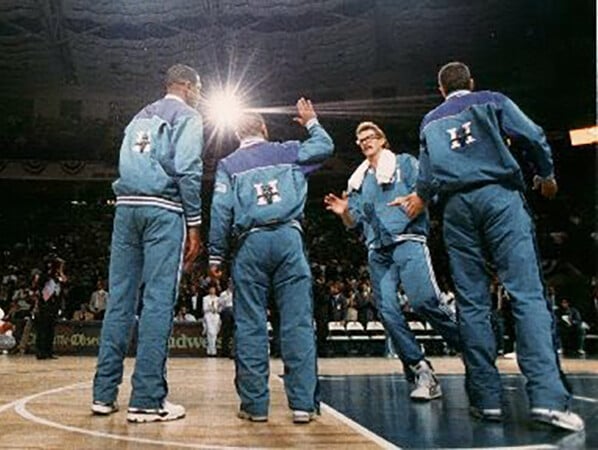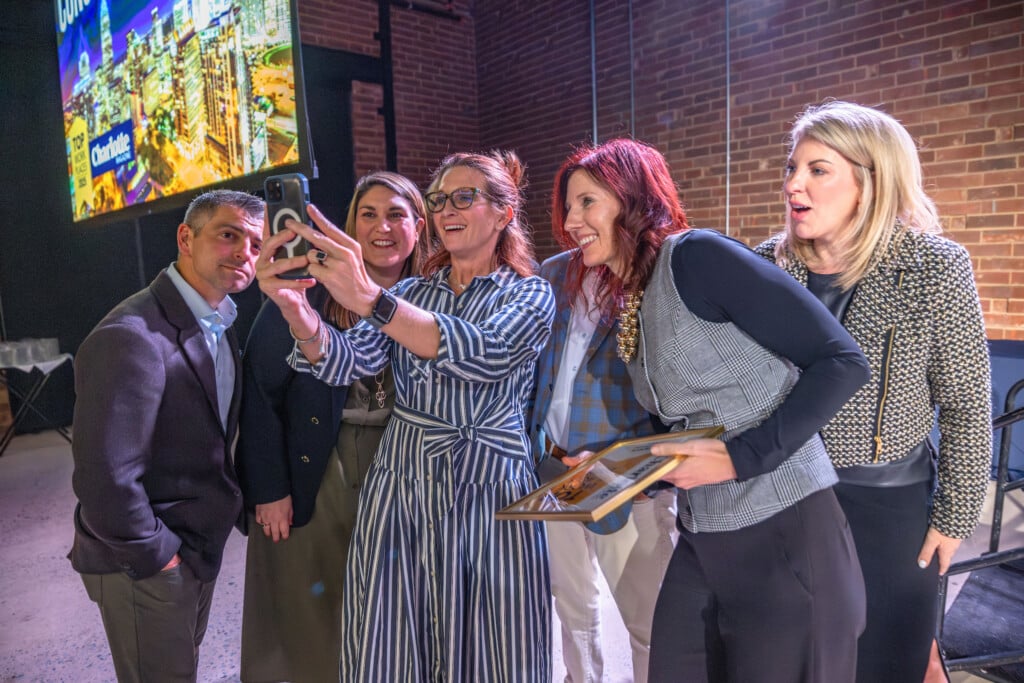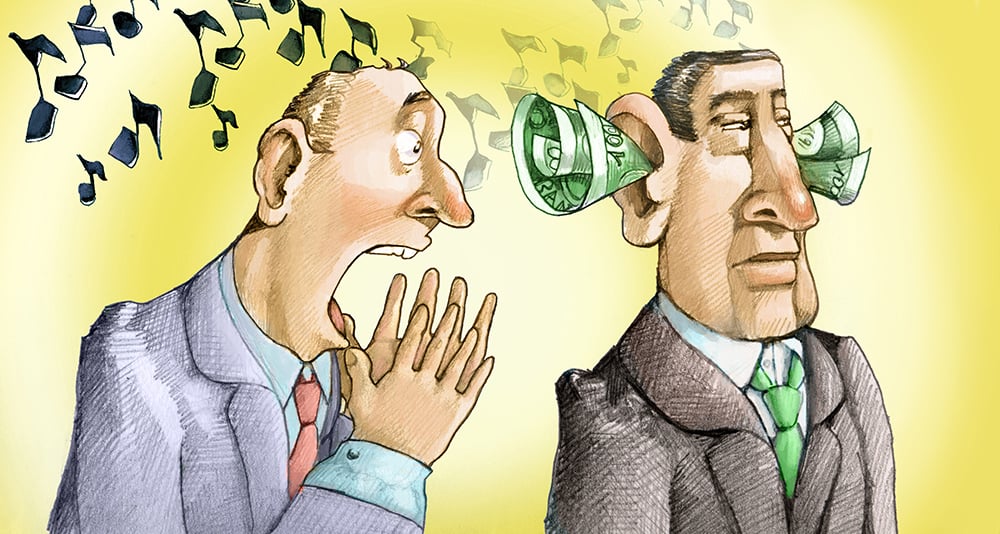How The Charlotte Hornets Lost Their Sting
The Hornets were once the city’s pride and passion. Now they’re an afterthought. What happened?

Two days before Christmas 1988, in a brand-new arena off Tyvola Road, the Charlotte Hornets played the Chicago Bulls. The Hornets had cast-off veterans, career backups, and a 5-foot-3-inch point guard. The Bulls had Michael Jordan. And the Hornets won, 103-101, on a basket by Kurt Rambis at the buzzer. “The place went nuts,” Rambis told writer Matt Crossman for a 2013 Charlotte magazine account of the Hornets’ first year. It was the first of 364 consecutive home sellouts.
Two days before Christmas 2024, in a 20-year-old arena in the heart of the city, the Hornets played the Houston Rockets. The Hornets trailed 62-31 at halftime, and the home crowd of 19,134 booed the team off the floor. (The team did rally somewhat in the second half to cut the Rockets’ final margin to 13.) The team’s 2024-25 record fell to 7-22. Its home attendance ranked in the NBA’s bottom third.
What the heck happened to cause the Hornets’ descent from beloved to belittled? Quite a bit—and it’s not even the same franchise. As we near the end of another uninspiring campaign, here are some of the signposts on the road to Boo City.
July 1985:
Businessman George Shinn meets with NBA officials about an expansion team in Charlotte. The city prepares to break ground on a wooded site off Tyvola Road for a new 24,000-seat arena. “The key step right now is, will this franchise make economic sense to pursue?” Shinn says. “Will I someday get a return on my investment? Will the city benefit? Will the new coliseum benefit? Will we make enough money to be able to put money back in the team for better players to eventually have a winner?”
April 22, 1987:
The NBA votes to expand into Charlotte and Miami starting with the 1988-89 season. Shinn originally intends to name the team the Charlotte Spirit, but fans favor “Hornets” in a name-the-team contest. It refers to British general Charles Cornwallis’ description of Charlotte as “a veritable hornet’s nest of rebellion” during the Revolutionary War. Fans’ second choice? The Knights.
Nov. 4, 1988:
“Our Grand Moment Arrives,” reads the headline on the front page of The Charlotte Observer. The Hornets lose their first game, 133-93, to the Cleveland Cavaliers. But Charlotte celebrates its entry into the big leagues with fireworks, an orchestra, a video tribute to Shinn, and teal-and-white pinstriped uniforms that help define sports fashion into the 1990s. “We are here,” Shinn tells a fan before the game, “and it does feel good.”
May 5, 1993:
The Hornets’ high-pollination mark. Alonzo Mourning hits a jump shot from the top of the key to beat the Boston Celtics, 104-103, before what the Observer describes as “a screaming, stomping, barking, towel-waving Coliseum crowd of 23,698 that took the party into the streets of Charlotte at game’s end.” This is the Hornets’ first appearance in the NBA playoffs, and their conquest of one of the dominant teams of the ’80s in a best-of-five series seems to symbolize a new era. The Hornets lose to the New York Knicks in the second round. But they’ve captured the hearts of the city.
April 28, 1997:
The Hornets lose at home, 104-95, to conclude a first-round sweep by the Knicks (them again). It’s a disappointment, but 1996-97 is the Hornets’ winningest year yet: a record of 54-28, with Glen Rice averaging 27 points a game and Dell Curry, dad of Steph, averaging 15. Nearly three decades later, the team still hasn’t surpassed it.
Sept. 16, 1997:
Unsealed court documents detail a 28-year-old Charlotte woman’s allegation that Shinn forced her to perform oral sex on him at his home in Tega Cay, South Carolina. Two years later, a jury finds Shinn not liable in the woman’s sexual assault lawsuit. But the civil trial airs on Court TV, and Shinn is forced to admit he’s been unfaithful to his wife, who has divorced him. The details tarnish the reputation of a man who has trumpeted his devotion to God and family. His team’s fortunes decline with him.
May 10, 2002:
The NBA’s 29 owners vote unanimously to allow the Hornets, now co-owned by Atlanta businessman Ray Wooldridge, to move to New Orleans. “It’s like having somebody in the family pass away,” says Harvey Gantt, the former Charlotte mayor who helped secure the franchise. “Who would have thought it would end this way?”
May 3, 2004:
The Charlotte Bobcats, owned by and named after Black Entertainment Television founder and CEO Bob Johnson, join the NBA. The team begins play in the 2004-05 season and moves into a new uptown arena the following year.
March 17, 2010:
The NBA approves Johnson’s sale of the Bobcats to Michael Jordan, who becomes the first former NBA player to become the majority owner of a franchise.
July 18, 2013:
Charlotte gets the Hornets back—the name, at least. The NBA approves the Bobcats’ name change to Hornets and the New Orleans team’s name to Pelicans.
Aug. 3, 2023:
The league approves Jordan’s sale of his majority share to Rick Schnall and Gabe Plotkin for a reported $3 billion. The basketball icon’s ownership hasn’t led to wins on the court—the team’s record is 423-600 over his 13 years, with only three playoff appearances.
Jan. 1, 2025:
ESPN issues its New Year’s Day NBA Power Rankings. The Hornets, with a record of 7-25, rank 27th of 30: “A humbling, hard-to-believe stat for Charlotte: It has lost twice in the past two weeks to the (Washington) Wizards, who have one of the worst point differentials in modern NBA history and have gone 1-23 against the rest of the league since the start of November,” writes Chris Herring. One silver lining, of sorts: The New Orleans Pelicans rank 29th.









